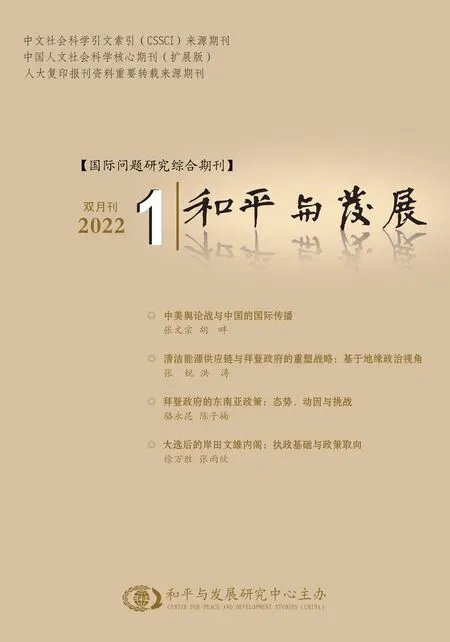The Biden Administration’s Policy Toward Southeast Asia: Momentum,Motivation and Challenges
After Biden took office, the United States, on the basis of inheriting the main framework of the Trump administration’s Southeast Asia policy,has gradually increased its strategic input in Southeast Asia to expand the depth and breadth of cooperation with Southeast Asian countries. First,consolidate its diplomatic influence, and focus on strengthening cooperation with Singapore, Vietnam, Malaysia, the Philippines and Indonesia among others. Second, increase economic input, expand investment in infrastructure construction projects, accelerate involvement in cooperation projects in the Mekong sub-region, and provide vaccine assistance to enhance its regional economic influence. Third, make adjustments to U.S. military strategy and troop deployment to enhance its alliance system and highlight “comprehensive deterrence” against China. The relevant measures of the Biden administration reflect the U.S. policy orientation of focusing on “whole-of-government”competition with China, enhancing its strategic influence over Southeast Asian countries, strengthening the strategic shaping of ASEAN and other regional mechanisms, and bringing Southeast Asia into the core area of the U.S. Indo-Pacific Strategy.
The Biden administration has been aggressive in promoting its diplomatic policy toward Southeast Asia, hoping to realize its strategic intention of furthering the Indo-Pacific Strategy, reshaping the order in the Indo-Pacific region and maintaining the hegemonic status of the U.S. through Southeast Asia. However, the Biden administration faces multiple challenges in its efforts to deepen ties with Southeast Asian countries, while a complete shift of Southeast Asian countries to the US camp is less likely.
Firstly, from the evolution of the international landscape, the global economic, scientific, technological, cultural, security and political patterns are currently going through deep-going adjustment, with the world entering a period of turbulence and transformation, and undergoing profound changes unseen in a century. Although the U.S. remains the only super power in the world, it can no longer dictate to the world. The unipolar era has gone forever,and a multipolar pattern is developing in twists and turns. Therefore, the U.S.cannot dominate the order in the Indo-Pacific alone.
Secondly, from the domestic affairs of the U.S., the situation of the COVID-19 pandemic remains grim, and the deep-seated social problems such as the gap between the rich and the poor, racial discrimination and left-right political differences are brewing concurrently, which are difficult to be resolved in a short term. These difficulties continue to draw on the political resources and energy of the Biden administration, resulting in the inability of the U.S.to push forward its domestic agendas, the backlash against the restoration of democratic values at home, inflation risks in restructuring American economy,and failure in keeping its foreign aid promises. As a result, America’s remaining credibility in Southeast Asia is eroding.
Thirdly, from the regional situation in Southeast Asia, most Southeast Asian countries choose to deal with the U.S. in a low-key and cautious manner, striving for a strategic “rebalancing” between China and the United States. The principle of “not taking sides” has gradually become the mainstream voice and basic consensus of regional countries in dealing with the ongoing China-U.S. strategic competition, and it has become the main political aspiration of regional countries to maintain ASEAN centrality and consolidate and promote ASEAN’s Indo-Pacific vision. As ASEAN countries have become increasingly dependent on China in epidemic prevention and control, economic recovery and other issues, even if some ASEAN countries have the intention of “using America to counter China”on certain issues, they will cautiously join or adhere to “cliques” promoted by the U.S. and its allies to deter China.
On the whole, the Biden administration faces no small challenges in promoting its diplomacy toward Southeast Asia, but there is no doubt that the relationship between the U.S. and Southeast Asia will continue to deepen in the future, and the region will once again become the focus in the game among major countries. The South China Sea dispute, the COVID-19 pandemic, the Belt and Road Initiative, the Mekong River issue, and the issue of building a regional order will be the focus of the interactive game among China, the U.S. and Southeast Asia. The strategic triangle relationship between China,the U.S. and Southeast Asia is profoundly affecting and reshaping the regional geopolitical landscape.

